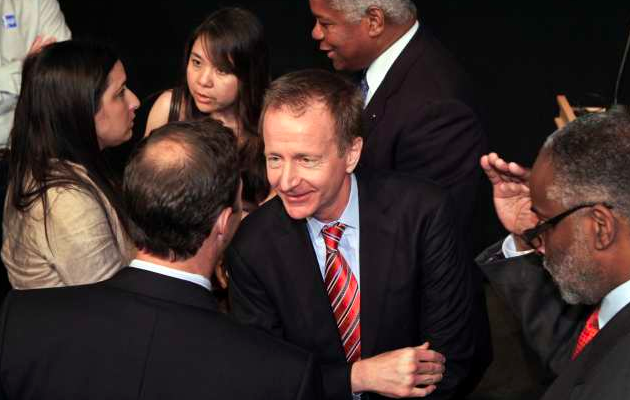 aNewDomain — Los Angeles Times and San Diego Union-Tribune publisher and CEO Austin Beutner is one of those incredibly powerful billionaires you’ve probably never heard of. With a twist.
aNewDomain — Los Angeles Times and San Diego Union-Tribune publisher and CEO Austin Beutner is one of those incredibly powerful billionaires you’ve probably never heard of. With a twist.
Like most down-low elites, particularly Wall Street moneymen, Beutner keeps a low profile. That is how he typically avoids the hassles and pitfalls that come with public (make that media) attention.
At the same time, he’s a former deputy mayor of Los Angeles. And here’s one of LA’s worst-kept secrets: He’s soon to announce he is running for mayor.
But what a connundrum! How do you get people who’ve never heard of you to cast their votes your way?
I drew cartoons, wrote essays and even did war correspondency for the Los Angeles Times for six years. But it wasn’t until I was investigating my firing by the Times at the behest of the Los Angeles Police Department that I even became aware of Beutner’s existence.
Given the fact that he took over as publisher a full year ago, not long after he tried to buy the Times, that says something about his low profile.
A process of elimination
Beutner came to my attention by process of elimination. The Times editorial board didn’t sign off on my firing on July 27 after the LAPD claimed I’d been lying about a 2001 jaywalking arrest and brought forward a crap tape that attempted to prove it.
When aNewDomain and I hired audio pros around the country to quickly enhance that old tape a few days later, I had all the proof I needed to show I never lied.
But it didn’t work. Even though the Times is supposedly a journalistic outlet that, presumably, would at least hear my side of the story before taking the LAPD at their word. LAPD is not exactly the hall of honesty over there, as everyone knows from just the recent cop scandals. And everyone knew also how much these cops hated me — even including the LA police union (LAPPL), which gloated at my firing a day after the Times did it.
much these cops hated me — even including the LA police union (LAPPL), which gloated at my firing a day after the Times did it.
Even the audio engineers the Times hired seemed to support my story in the transcripts they did of the improved tape, but the Times wouldn’t even mention that in its defense of this whole thing. Why?
Even if it just wanted to get rid of an outspoken cartoonist and columnist like me, why didn’t the editorial board sign off on my public humiliation in the pages of the Times and my firing?
Why was I never given a chance to appeal? Why didn’t they just quietly quit my freelance contract instead of trotting me out so publicly?
As far as I can tell, Editorial Page Editor Nick Goldberg came late to the party. The editor in chief doesn’t seem to have been in the lo op either.
op either.
So who ordered my virtual beheading?
Unless the horoscope lady did me in, here’s the one person left in the food chain who could’ve ordered my exection: the publisher. Austin Beutner.
So who is Austin Beutner?
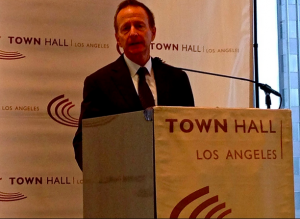 A native New Yorker, the 54-year-old Beutner grew up in Grand Rapids, Michigan, nicknamed “Furniture City” because it’s the home of Steelcase and similar manufacturers.
A native New Yorker, the 54-year-old Beutner grew up in Grand Rapids, Michigan, nicknamed “Furniture City” because it’s the home of Steelcase and similar manufacturers.
He was “the son of a schoolteacher and a manufacturing engineer,” according to a Times piece announcing his August 2014 appointment as publisher and CEO, a gig that pays $1.2 million a year at a company that has laid off many reporters and other staffers.
Beutner’s career as a money guy is immediately understandable by anyone who has watched the movie “Wall Street” or lived through the aftermath of a corporate takeover. Ordinary workers work harder for less, or get thrown out on the street. A tiny elite of executives make out like bandits.
You know how it works. The bankers take their cut and move on.
Beutner is one of the bankers.
People say Beutner is bland and boring.
If true, that’s because he hasn’t done much in life other than figure out how to separate companies from their money by separating workers from their jobs.
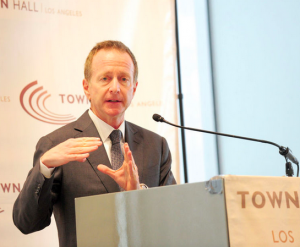 It’s what he was bred to do.
It’s what he was bred to do.
Beutner graduated from Dartmouth College in 1982 with a degree in economics. Then he went to work as a financial analyst for Smith Barney’s Mergers and Acquisitions Group.
He later joined the Blackstone Group in New York, one of the world’s largest private equity firms, and at 29 “became its youngest partner,” the Times report says.
“A notable Blackstone deal would be something like Universal Orlando,” the local NPR station KPCC reported in 2012. “Blackstone bought a chunk of that enterprise in 2000 for $275 million. NBC Universal bought Blackstone’s stake in 2011 — for $1.025 billion.”
Beutner’s “master of the universe” resume reads like a Zelig of how Wall Street doles out misery to Main Street.
The 1991 collapse of the Soviet Union led to more than a decade of economic and social chaos, most of which can be laid at the feet of the “shock economics” capitalism-in-a-hurry policy pushed upon Russia’s first, alcoholic leader, Boris Yeltsin by U.S. President Bill Clinton and Wall Street bankers salivating over the chance to monetize state assets stolen by the era’s violent kleptocrats.
Enter Austin Beutner.
The specifics around much of Beutner’s past are somewhat shadowy and nebulous. Somewhere along the way, however, probably during the late 1980s or early 1990s, he hooked up with the young Arkansas governor everyone in the financial world expected to become president in 1992.
Beutner’s ties to Bill and Hillary Clinton were instrumental to his rising wealth and political power.
During the early 1990s Beutner led the U.S. Russia Investment Fund, created by the Clinton administration State Department in order to funnel American taxpayer money into the private U.S.-aligned corporations that parachuted into Russia after the collapse of the USSR.
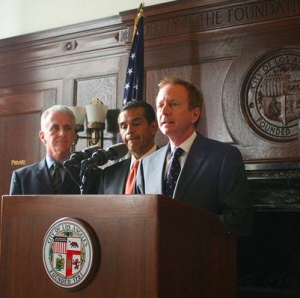 Barely 30 years of age, he already played hardball with his elders. Exploiting the looting of public enterprises by the oligarchs of the future under Boris Yeltsin’s over-the-top kleptocracy, Beutner elbowed a gentler eminence grise out of the way to secure the job.
Barely 30 years of age, he already played hardball with his elders. Exploiting the looting of public enterprises by the oligarchs of the future under Boris Yeltsin’s over-the-top kleptocracy, Beutner elbowed a gentler eminence grise out of the way to secure the job.
In 1996, Beutner abandoned the pillaging of the Russian ruins to co-found Evercore Holdings, now the private equity firm Evercore Partners, with Robert C. Altman (the ex-Clinton White House official embroiled in the Whitewater scandal and political advisor to Hillary in 2008, not the film director) and David Offensend.
Ten years later, Evercore was one of the largest M&A firms in the country.
Though he likes to consider himself a “good guy” investment banker interested in the public good, we’ll never know how many employees lost their jobs in downsizings related to Evercore-managed M&A deals.
Beutner = a center-right Democrat Mitt Romney minus the class-A hair and the goofy smile.
In 2000, at age 40, Beutner went to Los Angeles to oversee Evercore’s expansion on the West Coast. My, as they say, how the money rolled in.
When Evercore went public in 2006, he collected a $100 million paycheck.
With a face for radio and the charisma of a garden slug, Beutner never stood much of a chance.
Austin Beutner’s political aspirations
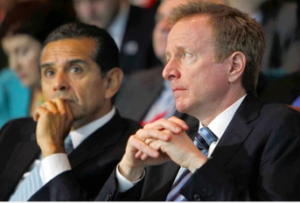 Fortunately for him, then-LA mayor Antonio Villaraigosa named him deputy mayor of economic development in 2010 — where, among other ill-fated projects that lined the pockets of his investment banker buddies at the expense of the taxpayer, he pushed to lure the NFL to a bring a football team to downtown LA.
Fortunately for him, then-LA mayor Antonio Villaraigosa named him deputy mayor of economic development in 2010 — where, among other ill-fated projects that lined the pockets of his investment banker buddies at the expense of the taxpayer, he pushed to lure the NFL to a bring a football team to downtown LA.
After his bid to buy The Los Angeles Times and eight other papers failed — he was up against the Koch Brothers, who also failed — he considered running for Villaraigosa’s job after the latter’s term limits kicked in in 2013.
But he couldn’t get enough support: When he suspended his bid, local political blog laobserved.com wrote that Beutner didn’t “really have much support to release, [though] he did have the endorsement of former mayor Richard Riordan and a smattering of business people.”
Beutner is an unabashed fan of throwing money at politicians of both parties in order to exert financial influence over the political process.
Now that he’s publisher of the Times, he is reportedly mulling a possible race for mayor of Los Angeles. But he still has that same old problem: No one in L.A. knows who he is.
So when democracy isn’t working for you, what do you do? You buy friends.
As the growing scandal surrounding my firing prompts reporters to investigate collusion between his paper and the cops, interesting information comes to light.
Beutner appears to have ties with the Los Angeles Police Department and its police union, the Los Angeles Police Protective League (LAPPL), whose $18.4 billion pension fund is managed by Oaktree Capital, the Beverly Hills private equity firm that happens to be the principal stockholder of Tribune Publishing, the parent company of The Los Angeles Times.
Is Beutner in bed with the LAPPL and/or LAPD?
Well, Beutner and the LAPPL do tend to turn up in the same lists of political contributors. Beutner and the LAPPL both belong to something called the 2020 Commission, one of those forward-looking we’re-in-charge-do-what-we-say elite-a-thons. Beutner has long received favorable coverage on the LAPPL’s blog. And the Times, which had laid off many street reporters, relies more than ever for story tips from the LAPD.
It’s pretty clear that the LAPPL likes Beutner: the LAPPL honored Beutner at its 2014 Eagle and Badge Gala, praising his “dedication to law enforcement.”
Given all this, it isn’t impossible to imagine Beutner agreeing to do the LAPPL the favor of firing his annoyingly anti-cop political cartoonist — especially when handed a file containing an audiotape that gives him a little cover.
If Beutner and the LAPPL aren’t in bed together, then it’s probably just a couple of martinis away.
For aNewDomain, I’m Ted Rall.
Image one: LAweekly.com, All Rights Reserved; image two: EagleAndBadgeFoundation.com, All Rights Reserved; image three: LAdowntownNews.com, All Rights Reserved; image four: JWalshConfidential.files.wordpress.com, All Rights Reserved. image five, of Austin Beutner with former LAPD Chief Parks: LAWeekly.com, All Rights Reserved; cover image: http://www.laweekly.com/news/austin-beutner-retires-from-the-mayors-office-to-make-way-for-2013-run-2391297

